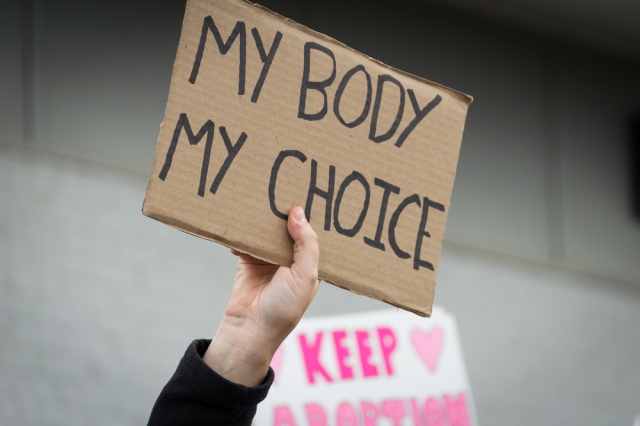Welcome to The Week in Reproductive Justice, a weekly recap of all news related to the hot-button issue of what lawmakers are allowing women to do with their bodies!
Last week, Buzzfeed reported on a new, Oxford-based exhibition, “My Body My Life,” that does what lawmakers across the world consistently refuse to do: let women who have had abortions share their voices about the issues. The exhibition features shirts telling the stories of women who have had the procedure, including biting lines like, “I didn’t want an abortion. I needed one,” “This is a health issue,” and “I want to be happy when I find out I’m pregnant.”
Aside from making The Old Fire Station a place to definitely, definitely hit up next time you find yourself in Oxford, the exhibition has greater implications for the reproductive justice movement at large. It humanizes women who are often subtly—or not-so-subtly—portrayed as murderers in political dialogue, but unlike manipulative, anti-choice ads featuring babies’ faces, it also includes real facts about abortion.
Notably, both facts and regarding women as autonomous humans are frequently missing from American legislative proceedings around reproductive rights. This week, in the Wisconsin Assembly, U.S. Congress, and a G7 meeting, this was especially the case. But of course, there was some good news, too:
Anti-choice lawmakers think the real reproductive coercion problem is doctors being forced to perform abortion
A quarter of all restrictions on abortion since the Roe v. Wade ruling in 1973 were passed in the last five years, and 90 percent of all counties in the country lack abortion providers, but this week, anti-choice lawmakers in the House and Senate introduced a bill to stop another (nonexistent) form of reproductive coercion—that is, doctors allegedly being forced to perform the procedure.
According to a report from The Hill Thursday, the Conscience Protection Act would allow health care providers to sue if they’re “coerced” into “participating” in abortions or “face discrimination” at work for not performing the procedure. What’s concerning is the broadness of the word “participating.” In most states, medical providers have some obligation to accurately convey to women with unwanted pregnancies what their medical options are. This isn’t really a free speech issue so much as it is a “do your job” issue. I’m hardly an expert about the medical field, but I’d say giving patients complete and objective information about their medical options is literally their job, and if you can’t do your job because of your personal views, why should the burden fall on your patients?
There’s plenty of very real issues related to reproductive coercion, pressuring people to make certain bodily decisions, and imposing personal beliefs on the population at the expense of women’s health and safety, and this particular bill is stealing lawmakers’ time, resources and efforts from actual problems. It’s frustrating, to say the least.
This particular bill has been worked into a spending bill that Congress must pass by Dec. 8 in order to not shut down the government. If it’s any source of comfort, previous versions of this bill pushed by the House Pro-Life Caucus and House Freedom Caucus have all failed.
Wisconsin Rep. pushing for ban on abortion coverage says it’s bad for “labor force”
In case you thought anti-choice lawmakers’ rhetorical strategies for attacking abortion rights—namely, obsessing over and fetishizing unborn fetuses—couldn’t get any more bizarre, Wisconsin state Rep. Scott Allen is here to prove you wrong.
Last week, Allen gave an impassioned speech that, in so many words, essentially said women’s wombs are the state’s baby-making machines: “Labor force shortages are tied to population declines. And labor force shortages are a limiting factor in economic growth. … In spite of this … the Democrats continue their effort to support the abortion industry.”
AB 128, the bill in question, which allows abortion coverage in state insurance plans only in the case of rape, incest, or a threat to the mother’s life, passed on Thursday. In essence, we can continue watching our taxpayer dollars go to all kinds of things we oppose—i.e. wars where born, living women are killed—but not basic, life-saving health care for low-income women.
Trump administration won’t compromise on abortion, reproductive rights at G7
U.S. negotiators at a G7 meeting in London this week refused to compromise on three key issues including climate change, universal health coverage, and—you guessed it!—reproductive health care for women and children, according to a Buzzfeed report.
We’ve already learned from a recent case involving an undocumented minor denied multiple times the right to leave a detainment center to have the procedure by the Trump administration that the human rights of those not recognized as American citizens are not of concern to this administration—frankly, the human rights of American women aren’t really of concern to the Trump administration, either, but it has more leverage to control and attack undocumented women.
Earlier this year, Trump reinstated an executive order implemented by President Reagan that denied funding to any group that gave information about abortion and even birth control to women and children abroad. In countries plagued with high maternal mortality rates and limited access to basic pre and post-natal health care, information about these resources can be life-saving. As if screwing over American women weren’t enough, it looks like the Trump administration is steadfastly prepared to take things a lot further around the globe.
Birth control access scores wins in Massachusetts House, Notre Dame
In the wake of a controversial order last month that would allow sexist employers/insurers across the country to deny women basic, sometimes life-saving health care (aka birth control), this week saw a couple important developments. After briefly announcing that it would no longer offer birth control coverage, Notre Dame this week reversed on this policy.
And in Massachusetts, the state’s House of Representatives approved a bill that would “ensure access to free birth control in the state and shield state residents from changes to federal law regarding contraceptive coverage requirements.”
States and institutions are fighting against federal attacks on women’s rights and that’s great — it’s just disappointing that we’re now living in an age where your rights and access to crucial health care have become contingent on which state you live in, which university you attend, or how much money you have.
Tuesday elections bring victories for reproductive rights
To end things on a positive note, let’s talk about Tuesday—a day of glorious, historic firsts for the representation of women, people of color, and LGBTQ people in various public offices across the country. Coincidentally, many were Democrats—and many were active supporters of reproductive rights. You can read more about them and their records here, but to the point, here’s the thing about reproductive rights.
Laws that touch on this issue have huge impact on the living standards of women and other marginalized groups, and yet rarely if ever do we directly vote on these policies on our ballots the way we do measures related to clean air, schools and parks. We vote on reproductive rights by voting on who we want to represent us, who we trust to vote on reproductive rights in ways that empower us and protect our human rights. Presidential elections are important, yes, but don’t sit out midterms or local or special elections in your community. Representation matters for a lot of reasons, and the preservation of our bodily autonomy is a huge one.
Tune in next week to see what lawmakers will try next in their never-ending mission to derail reproductive justice!
(image: Shutterstock)
Want more stories like this? Become a subscriber and support the site!
—The Mary Sue has a strict comment policy that forbids, but is not limited to, personal insults toward anyone, hate speech, and trolling.—









Published: Nov 10, 2017 03:32 pm